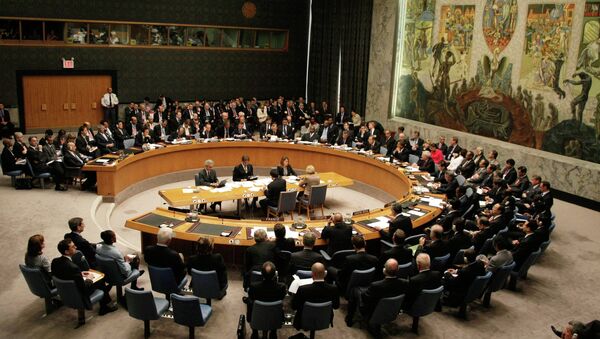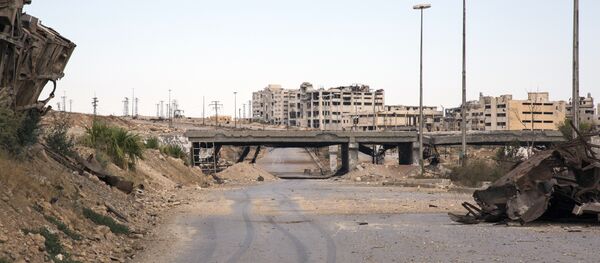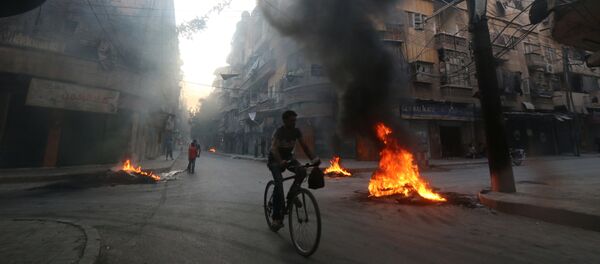Meanwhile, the decision to vote Russia off this UN Human Rights Council is being widely touted in the West as a rebuke over its role in the conflict in Syria. Perhaps, then, it is worth reminding ourselves what this role has been.
In September of 2015 Syria was sitting on the edge of a precipice after four years of unremitting conflict, wherein the country’s army was struggling to defeat an invasion by thousands of radical extremists, funded, armed, and supported by among others Saudi Arabia. Said extremists were intent on exterminating minority communities that have existed in Syria for over a millennia.
Moreover, the medieval ideology fueling these extremists – an ideology near indistinguishable from that which underpins the religious and social character of Saudi Arabia – had also inspired terrorist attacks across Europe, including Russia. With this in mind, is there anybody seriously suggesting that Russia’s decision to answer the call of a country and a people fighting for their very survival was anything but ethical and moral? Seriously? Would they prefer Syria to be destroyed?
Bringing things forward to 2016 and the choice facing the Syrian people is both simple and stark: either a government led by Bashar al-Assad, under which the right of the country’s aforementioned minorities are protected and upheld, or a government led by Nusra Front, under which they are not, sits in power in Damascus. In other words, there is no choice at all.
As western politicians and ideologues know, with Aleppo liberated the prospect of the overthrow of the Assad government, which has and continues to be the overriding objective of the US, UK and Saudi Arabia, becomes a distant dream. And while on the subject, the depiction of Assad as an authoritarian dictator hated by his people is false. On the contrary, the country’s president stands united with the vast majority of Syrians against this foreign-funded and supported insurrection that has engulfed the country in such chaos and human suffering over the last five years.
It is impossible to avoid the double standards that fuel the foreign policies of governments responsible for human suffering on an unprecedented scale since the supposed end of the Cold War – in Yugoslavia, Afghanistan, Iraq, Libya, and now Syria – yet who presume to lecture the world on democracy and human rights. This problem is particularly acute when it comes to their ongoing alliance with Saudi Arabia, which has just been elected to the Human Rights Council for the second time.
Despite the routine barbarity of beheadings, crucifixions, and other cruel punishments that constitute the justice system in Riyadh, Washington, London, and Paris continue to regard the kingdom as a key ally. For both the US and British governments, Saudi Arabia has long been their single best customer when it comes to their respective arms industries.
You might think that any government in possession of such glaring and incontrovertible evidence of war crimes, utilizing weaponry that your own arms companies have supplied, would place an immediate moratorium on any further arms sales until a full and independent investigation was carried out to make sure that international law was not being violated and that civilians were not being targeted.
But in the case of Washington and London would be wrong. Britain’s Foreign Secretary, Boris Johnson, has on the contrary defended the continuation of UK arms sales to the Saudis. He did so in a written statement that was based on a Saudi-led inquiry into recent allegations of Saudi war crimes in Yemen.
"They [the Saudis] have the best insight into their own procedures," Johnson wrote, "and will be able to conduct the most thorough and conclusive investigations. It will also allow the coalition forces to work out what went wrong and apply the lessons learned in the best possible way. This is the standard we set ourselves and our allies."
When it comes to Saudi influence in the West, there is growing resistance to its role in financing the establishment of mosques which preach the same extreme and deeply sectarian interpretation of Islam, Wahhabism, that constitutes the religious foundations upon which the state rests and from which the Saudis derive their legitimacy.
In 2015 German Vice Chancellor, Sigmar Gabriel, publicly accused the Saudis of funding Islamist extremism. In an interview with a German magazine, the Vice Chancellor said, “Wahhabi mosques are financed all over the world by Saudi Arabia. In Germany, many dangerous Islamists come from these communities.”
A world interested in international law and human rights as universal concepts cannot accept a state of affairs in which both are regarded as optional extras by states in pursuit of their own strategic and geopolitical interests. This is both unacceptable and unsustainable. If the UN and its member-states are truly concerned with upholding the human rights of all peoples in every state, there is no place for hypocrisy.
The views expressed in this article are solely those of the author and do not necessarily reflect the official position of Sputnik.







